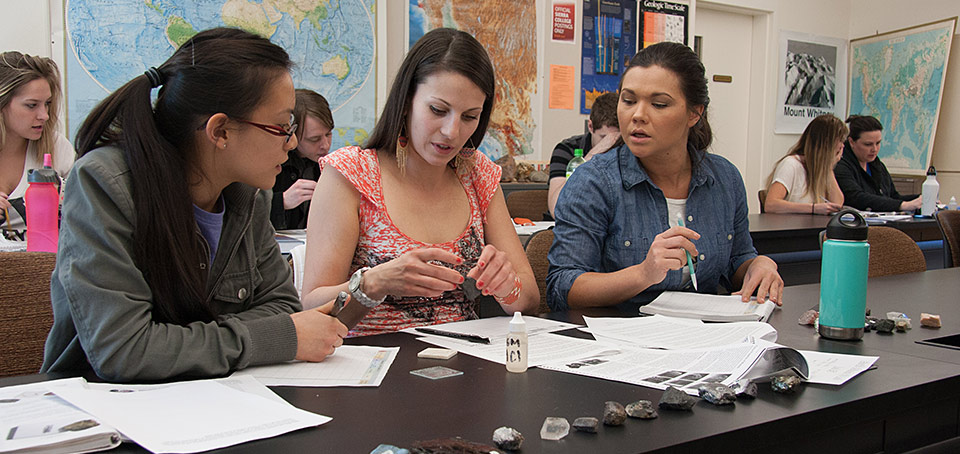
Contact Information

- Division
- STEM
- Dean
- Carlos Reyes
- Associate Dean
- Megan D'Errico

- Division Office
- V 211, Rocklin Campus
Overview
These courses give a general educational background of the earth’s geology, atmosphere, oceans and its place in time and space.
TRANSFER MAJOR REQUIREMENTS are available in the Counseling Center. In all cases, students should consult with a counselor for specific transfer requirements. Positions for which four-year graduates in the disciplines in Earth Science are qualified include teaching, research, industry, regional planning, environmental analysis and others in the minerals-fuels industries.
Faculty
Holly Dodson
Professor, Earth Science
B.S., University of California, Riverside
M.A., University of California, Santa Barbara
Allison Jones
Assistant Professor, Earth Science
A.S., Diablo Valley College
B.A., University of The Pacific
M.S., University of Wisconsin, Madison
Degrees/Certificates
Geology for Transfer
AS-T Degree
Geology investigates our planet Earth from diverse perspectives, spanning from the smaller scale study of its building blocks (minerals) to the larger scale study of its dynamism (Theory of Plate Tectonics), as well as its history and the relationship between the physical environment and the evolution of life. This is accomplished by viewing the planet as a system, where there are interactions between the lithosphere, the atmosphere, the hydrosphere and the biosphere. Within this context, students develop strong critical thinking, problem solving, communication and technical skills to work in a relatively large set of career fields beyond that of Geology, such as Hydrology, Geophysics, Oceanography, Meteorology and Environmental Science. The required curricular sequence also provides the necessary skills in the physical sciences and mathematics required for junior standing at baccalaureate institutions. Thus, future Earth Scientists acquire both a global and sequential way to approach topics, with an emphasis on the interdisciplinary nature of the field and also enhance their expertise through hands-on laboratory work, readying themselves for the applied nature of the workforce (industry, consulting and government agencies).
The Associate in Science in Geology for Transfer degree (AS-T) prepares students to transfer into the CSU system to complete a bachelor’s degree in Geology or a major deemed similar by a CSU campus. Students earning an associate degree for transfer and meeting the CSU minimum transfer admission requirements are guaranteed admission with junior standing to the CSU system, but not to a particular campus or major. Upon transfer, students will be required to complete no more than 60 additional prescribed units to earn a bachelor’s degree.
To earn the Associate in Science in Geology for Transfer degree, students must complete 60 CSU-transferable semester units with a minimum grade point average of 2.0, including both of the following:
- completion of all courses required for the major with grades of “C” or better; and
- California General Education Transfer Curriculum (Cal-GETC)
The exact wording of the law pertaining to associate degrees for transfer may be found in Education Code Section 66746.
It is highly recommended that, prior to transferring, students complete courses that satisfy the CSU United States History, Constitution and American Ideals graduation requirement. In all cases, students should consult with a counselor for more information on university admission and transfer requirements.
RESTRICTION: International coursework from non-United States regionally accredited institutions cannot be applied to associate degrees for transfer.
Required Courses
| Code | Title | Units |
|---|---|---|
| ESCI 0001 | Physical Geology | 3 |
| ESCI 0001L | Physical Geology Laboratory | 1 |
| ESCI 0003 | Historical Geology | 3 |
| ESCI 0003L | Historical Geology Laboratory | 1 |
| CHEM 0001A | General Chemistry I (OR) | 5-6 |
| or CHEM 0003A & CHEM 0003B | General Chemistry I - Part 1 and General Chemistry I - Part 2 | |
| CHEM 0001B | General Chemistry II | 5 |
| MATH 0030 | Analytical Geometry and Calculus I | 4 |
| MATH 0031 | Analytical Geometry and Calculus II | 4 |
| Total Units | 26-27 | |
Additional Recommended Preparation
While the following courses are not required for this degree, completion of these courses will better prepare students for upper-division geology courses.
| Code | Title | Units |
|---|---|---|
| PHYS 0205 & 0205L | Principles of Physics: Mechanics and Principles of Physics Laboratory: Mechanics | 5 |
| PHYS 0210 & 0210L | Principles of Physics: Electricity and Magnetism and Principles of Physics Laboratory: Electricity and Magnetism | 4 |
| PHYS 0215 & 0215L | Principles of Physics: Heat, Waves and Modern Physics and Principles of Physics Laboratory: Heat, Waves and Modern Physics | 4 |
Geology
AS Degree
A two-year associate degree in Geology prepares students to work in entry-level technical positions in the geological profession, including such fields as environmental assessment and mitigation, hydrology, mining, agronomy, conservation and interpretation. Additional professional opportunities are available for students with advanced degrees. In all cases, students should consult with a counselor for more information on university admission and transfer requirements. Students must fulfill the following major requirements with grades of “C” or better, complete a minimum of 60 degree-applicable semester units (12 of which must be completed at Sierra College) with a grade point average of at least 2.0 and complete one of the following three general education patterns:
- Sierra College Associate Degree Requirements (Local General Education)
- California General Education Transfer Curriculum (Cal-GETC)
Required Courses
| Code | Title | Units |
|---|---|---|
| ESCI 0001 | Physical Geology | 3 |
| ESCI 0001L | Physical Geology Laboratory | 1 |
| ESCI 0003 | Historical Geology | 3 |
| ESCI 0003L | Historical Geology Laboratory | 1 |
| Select 1-2 units from the following: 1 | 1-2 | |
| Sierra Nevada and Western Basin and Range Provinces | ||
| Great Valley and Coast Range Provinces | ||
| Great Valley, Coast Ranges, and Sutter Buttes | ||
| Western Sierra Nevada and the Mother Lode | ||
| Major Rock Units of the Northern Sierra | ||
| Weekend Field Geology - Point Reyes | ||
| Weekend Field Geology | ||
| Field Geology of Western North America | ||
| Select 4-6 units from the following: | 4-6 | |
| General Chemistry I (OR) | ||
| General Chemistry I - Part 1 and General Chemistry I - Part 2 | ||
| Basic Concepts in Physics and Basic Concepts in Physics Laboratory | ||
| General Physics I and General Physics I Laboratory | ||
| Principles of Physics: Mechanics and Principles of Physics Laboratory: Mechanics | ||
| Select 6-8 units from the following: | 6-8 | |
| Elementary Astronomy | ||
| General Chemistry II | ||
| California Geology | ||
| Introduction to Oceanography | ||
| Introduction to Oceanography Laboratory | ||
| Geology of National Parks and Monuments | ||
| Sierra Nevada and Western Basin and Range Provinces 1 | ||
| Great Valley and Coast Range Provinces 1 | ||
| Great Valley, Coast Ranges, and Sutter Buttes 1 | ||
| Western Sierra Nevada and the Mother Lode 1 | ||
| Major Rock Units of the Northern Sierra 1 | ||
| Weekend Field Geology - Eastern Sierra 1 | ||
| Weekend Field Geology - Yosemite 1 | ||
| Weekend Field Geology - Point Reyes 1 | ||
| Weekend Field Geology - Southern Coast Range 1 | ||
| Weekend Geology and Volcanoes of Northeastern California 1 | ||
| Field Geology of Western North America - Death Valley 1 | ||
| Field Geology of Western North America - Geology of Utah 1 | ||
| Field Geology of Western North America - Western Deserts 1 | ||
| Field Geology in the Sierra Nevada 1 | ||
| Geology of the Cascade Volcanoes 1 | ||
| Coastal Geology 1 | ||
| Weekend Field Geology 1 | ||
| Field Geology of Western North America 1 | ||
| Weather and Climate | ||
| Introduction to Geographic Information Systems (GIS) | ||
| Pre-Calculus Mathematics | ||
| Analytical Geometry and Calculus I | ||
| General Physics II and General Physics II Laboratory | ||
| Principles of Physics: Electricity and Magnetism and Principles of Physics Laboratory: Electricity and Magnetism | ||
| Principles of Physics: Heat, Waves and Modern Physics and Principles of Physics Laboratory: Heat, Waves and Modern Physics | ||
| Total Units | 19-24 | |
- 1
Only 3 units total may be taken from the field studies courses.
Courses
Understanding course descriptions
ESCI 0001. Physical Geology
Units: 3
Formerly known as GEOL 1
Prerequisite: Eligibility for ENGL C1000
Advisory: Concurrent enrollment in ESCI 1L
Hours: 54 lecture
Dynamic nature of earth's geologic processes. Earthquakes, volcanoes, mountain building, landslides, rocks, minerals, fossils, erosion, glaciation, deserts, shorelines, groundwater, and plate tectonics. (C-ID GEOL 100) (CSU, UC)
ESCI 0001L. Physical Geology Laboratory
Unit: 1
Formerly known as GEOL 1L
Prerequisite: Completion of or concurrent enrollment in ESCI 1
Hours: 54 laboratory
Minerals, rocks, fossils, aerial photos, topographic and geologic maps. Field trip(s) may be required during regular lab time. (C-ID GEOL 100L) (CSU, UC)
ESCI 0002. California Geology
Units: 3
Formerly known as GEOL 2
Advisory: Completion of ESCI 10 with grade of "C" or better
Hours: 54 lecture
An introduction to the geology of California, including tectonic processes, geologic structures, physiographic provinces, local rocks and minerals, landforms, natural resources, geologic history, and natural hazards in the state. (C-ID GEOL 200) (CSU, UC)
ESCI 0003. Historical Geology
Units: 3
Formerly known as GEOL 3
Corequisite: Concurrent enrollment in ESCI 3L
Advisory: Completion of ESCI 1 and 1L with grades of "C" or better
Hours: 54 lecture
An introduction to Earth's history and the life it supports. Includes geologic dating, plate tectonics, stratigraphy, fossils, biological evolution, the planet's origin, and the processes that have influenced paleogeography during the past 4.6 billion years. Designed for Geology majors. (C-ID GEOL 110) (CSU, UC)
ESCI 0003L. Historical Geology Laboratory
Unit: 1
Formerly known as GEOL 3L
Prerequisite: Completion with grade of "C" or better or concurrent enrollment in ESCI 3
Advisory: Completion of ESCI 1 and ESCI 1L
Hours: 54 laboratory
Hands-on learning in the topics of Earth history. Includes geologic dating, fossils, plate tectonics, minerals and rocks, biological evolution, the planet's origin, and the processes that have influenced paleogeography and life history during the past 4.6 billion years. (C-ID GEOL 110L) (CSU, UC)
ESCI 0007. Energy, Environment, and Climate
Units: 3
Also known as ESS 7
Advisory: Eligibility for ENGL C1000
Hours: 54 lecture
Analysis of the nature of energy and the environmental impact of its societal use in the context of Earth's record of changing climate. Explores current global climate change due to post-1750 greenhouse gas emissions and strategies for mitigation and adaptation to changing climate predictions, emphasizing future alternative energy sources. Designed for students majoring in areas related to the environmental sciences and/or those interested in developing a substantiated understanding of the role played by citizens in ensuring a healthy environment for future generations. (CSU, UC)
ESCI 0010. Introduction to Earth Science
Units: 3
Prerequisite: Eligibility for ENGL C1000
Hours: 54 lecture
Introduction to concepts of geology, oceanography, meteorology, and astronomy for science or non-science majors. (C-ID GEOL 120) (CSU, UC)
ESCI 0010L. Introduction to Earth Science Laboratory
Unit: 1
Prerequisite: Completion with grade of "C" or better or concurrent enrollment in ESCI 10
Hours: 54 laboratory
Exploration of the solid Earth, its atmosphere, hydrosphere, and place in the solar system. Learning through investigation and systematic laboratory procedures, focused on the physical and chemical systems of the Earth such as the tectonic cycle, rock cycle, hydrologic cycle, weather and climate. Field trip(s) may be required during regular lab time. (C-ID GEOL 120L) (CSU, UC)
ESCI 0015. Introduction to Oceanography
Units: 3
Advisory: Eligibility for ENGL C1000 or equivalent
Hours: 54 lecture
Physical, chemical, and biological aspects of our ocean environment with emphasis on geologic processes. (CSU, UC)
ESCI 0015L. Introduction to Oceanography Laboratory
Unit: 1
Prerequisite: Completion of or concurrent enrollment in ESCI 15
Hours: 54 laboratory
Exploration of the ocean environment, including physical, chemical and biological aspects. Learning through investigation and systematic laboratory procedures. (CSU, UC)
ESCI 0016G. Field Paleontology and Ancient Environments
Units: 1-2
Also known as BIOL 16G
Hours: 30 (12 lecture, 18 laboratory) per unit
Investigations into the ecology of environments in the geologic past through field work at fossil sites. Comparisons and contrasts made between ancient (fossil) communities and the current (living) communities of selected study sites. Differences and similarities between the plants and animals used as evidence to reconstruct ancient ecological communities. This class requires the ability to hike moderate distances on uneven ground. This class will involve camping in either developed campsites or in undeveloped wilderness areas. (CSU)
ESCI 0028. Independent Study
Units: 1-3
Designed for students interested in furthering their knowledge at an independent study level in an area where no specific curriculum offering is currently available. Independent study might include, but is not limited to, research papers, special subject area projects, and research projects. See Independent Study page in catalog. (CSU, UC-with unit limitation)
ESCI 0050. Geology of National Parks and Monuments
Units: 3
Formerly known as GEOL 50
Hours: 54 lecture
Investigation of geology and geologic history in the formation of North American national parks and monuments including the Grand Canyon, Bryce, Zion, and Yosemite. (CSU, UC)
ESCI 0054A. Sierra Nevada and Western Basin and Range Provinces
Units: 0.5
Formerly known as GEOL 51A
Hours: 9 lecture
Field lecture course designed to teach students the geology of portions of the Sierra Nevada and Western Basin and Range Provinces. Sites along I-80 and old highway 40 are examined. (CSU)
ESCI 0054B. Great Valley and Coast Range Provinces
Units: 0.5
Formerly known as GEOL 51B
Hours: 9 lecture
Field lecture course designed to teach students the geology of portions of the Great Valley and the Coast Range Provinces. Sites along I-80, the Russian River, the Pacific Coast, and the San Andreas Fault are examined. (CSU)
ESCI 0054C. Great Valley, Coast Ranges, and Sutter Buttes
Units: 0.5
Formerly known as GEOL 51C
Hours: 9 lecture
Field lecture course designed to teach students the geology of portions of the Great Valley, the Coast Ranges, and the Sutter Buttes. Sites west from Roseville through Woodland and Capay Valley to Clear Lake, the Central Sacramento Valley, and the Sutter Buttes are examined. (CSU)
ESCI 0054D. Western Sierra Nevada and the Mother Lode
Units: 0.5
Formerly known as GEOL 51D
Hours: 9 lecture
Field lecture course designed to teach students the geology of portions of the Western Sierra Nevada and the Mother Lode. Sites along Highway 49 are examined. Entrance and transportation fees may be required. (CSU)
ESCI 0054E. Major Rock Units of the Northern Sierra
Units: 0.5
Formerly known as GEOL 51E
Hours: 9 lecture
Field lecture course designed to teach students the geology of major rock units of the Northern Sierra Nevada. Moderate day hike is involved. Entrance fees may be required. (CSU)
ESCI 0055A. Weekend Field Geology - Eastern Sierra
Unit: 1
Hours: 18 lecture
Weekend field trip to the eastern Sierra Nevada. A 1 hour and 50 minute pre-session will be held prior to the trip. Hiking may be necessary. Camping, entrance, and transportation fees may be required. (CSU)
ESCI 0055B. Weekend Field Geology - Yosemite
Unit: 1
Hours: 18 lecture
Weekend field trip to Yosemite covering the origin, evolution, and geology of Yosemite National Park and surrounding areas. A 1 hour and 50 minute pre-session will be held prior to the trip. Hiking may be necessary. Camping, entrance, and transportation fees may be required. (CSU)
ESCI 0055C. Weekend Field Geology - Point Reyes
Unit: 1
Hours: 18 lecture
Exploration of the natural history of the Point Reyes area, emphasizing its geologic history and geomorphology. Camping, entrance and transportation fees may be required. (CSU)
ESCI 0055D. Weekend Field Geology - Southern Coast Range
Unit: 1
Hours: 18 lecture
Exploration of the natural history of southern Coast Ranges. May include national parks (eg. Carrizo Plain, Pinnacles) and selected areas of the San Andreas Fault. Some hiking required. Camping and/or park entrance fees may be required. A 1 hour and 50 minute classroom pre-session is required. (CSU)
ESCI 0055E. Weekend Geology and Volcanoes of Northeastern California
Unit: 1
Hours: 18 lecture
Exploration of the natural history of the volcanoes and mountains of northeastern California. May include national parks (eg. Lassen, Lava Beds). Some hiking required. Camping and/or park entrance fees may be required. A 1 hour and 50 minute classroom pre-session is required. (CSU)
ESCI 0055F. Weekend Field Geology
Unit: 1
Formerly known as GEOL 52F
Hours: 18 lecture
Weekend (sometimes including Friday) field trips to selected locations of geologic interest in California and bordering areas. Hiking may be necessary. Camping, entrance and transportation fees may be required. (CSU)
ESCI 0056A. Field Geology of Western North America - Death Valley
Units: 2
Hours: 54 (27 lecture, 27 laboratory)
One-week field experience to Death Valley and eastern Sierra Nevada. Emphasis placed on the geologic history of the area. We will be seeing rocks spanning over 1 billion years of earth history. A three-hour pre-session prior to the trip is required. Hiking may be necessary. Camping, entrance, and transportation fees may be required. (CSU)
ESCI 0056B. Field Geology of Western North America - Geology of Utah
Units: 2
Hours: 54 (27 lecture, 27 laboratory)
Field course covering the National Parks of northern Arizona, and Utah including, but not limited to: Zion, Bryce, Canyonlands, Grand Canyon, Monument Valley, Arches, and Capitol Reef. Entrance and transportation fees may be required. (CSU)
ESCI 0056C. Field Geology of Western North America - Western Deserts
Units: 2
Hours: 54 (27 lecture, 27 laboratory)
Field experience covering areas of the Southern California desert, including Carrizo Plain, Barstow, Joshua Tree National Park, Salton Sea, and Anza Borrego State Park. Emphasis will be placed on the geologic history of the region. A three-hour pre-session prior to the trip is required. Hiking may be necessary. Camping, entrance, and transportation fees may be required. (CSU)
ESCI 0056D. Field Geology in the Sierra Nevada
Units: 2
Hours: 36 lecture
Exploration of the natural history of the Sierra Nevada. May include national parks (eg. Yosemite, Sequoia, Kings Canyon, Mono Lake). Some hiking required. Camping and/or park entrance fees may be required. A 2 hour and 50 minute classroom pre-session is required. (CSU)
ESCI 0056E. Geology of the Cascade Volcanoes
Units: 2
Hours: 36 lecture
Exploration of the natural history of the volcanoes and mountains of the Cascade Range of western North America. May include national parks (eg. Lassen, Lava Beds, Crater Lake, Mount Saint Helens, Rainier). Some hiking required. Camping and/or park entrance fees may be required. A 2 hour and 50 minute classroom pre-session is required. (CSU)
ESCI 0056F. Field Geology of Western North America
Units: 2
Formerly known as GEOL 53F
Hours: 54 (27 lecture, 27 laboratory)
One-week field experience to selected areas of geologic interest. Emphasis placed on the geologic history of the many parks and monuments of the west. A three-hour pre-session prior to the trip is required. Hiking may be necessary. Camping, entrance and transportation fees may be required. (CSU)
ESCI 0056G. Coastal Geology
Units: 2
Hours: 36 lecture
Exploration of the natural history of the western American coast. May include national parks (eg. Pfeiffer, Point Reyes, Redwoods). Some hiking required. Camping and/or park entrance fees may be required. A 2 hour and 50 minute classroom pre-session is required. (CSU)
ESCI 0095. Internship in Earth Science
Units: 0.5-4
Designed for advanced students to work in an area related to their educational or occupational goal. Provides new on-the-job technical training under the direction of a worksite supervisor, allowing students to expand knowledge and skills in the chosen field. Mandatory orientation session and faculty approval to determine eligibility. One unit of credit is equal to 54 hours of work. Students may earn up to a total of 16 units in internship courses (any course numbered 95 and PDEV 94). (CSU-with unit limitation)
Program Student Learning Outcomes (PSLOs)
- Apply the fundamental principles of Earth Science to natural phenomena.
- Solve Earth Science problems using field data.
- Critique, properly manipulate, and present laboratory data needed to solve Earth Science problems.
- Assemble and critique literature relevant to Earth Science investigations.
- Relate Earth Science concepts to real events such as earthquakes, volcanic eruptions, or sever weather events.



